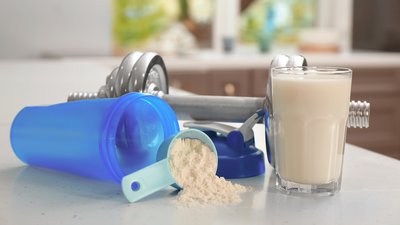Typically, when people begin training for the first time, they are impressively enthusiastic and equally as impatient. They want results and they want them now. This mentality usually leads to the exploration of various supplements, of which there are many.
A large number of products to choose from accompanied by an excessive number of so-called experts or spokespeople claiming they have the best product creates a bit of confusion. Unfortunately, most supplements aren't worth the price of the neon colored bottle they come in. They flat out don't work.
Others may be effective, but aren't necessary for a beginner, who will improve rapidly without what I'll call advanced supplementation.
In my mind, beginners need to focus on three things, in order of importance:
- Working hard.
- Ensuring that you're using a well-designed training program geared toward your goals.
- Manipulating your diet to ensure an appropriate nutrient balance, and utilizing supplements to help you achieve this goal.
The remainder of this article will focus on the supplementation side of things, but remember - that's still number 3 on the list. You can supplement yourself to kidney damage and it won't matter if you don't have a good program and unparalleled work ethic.
When it comes to supplements, it's best to stick with supplements that are supported by science, both in terms of efficacy and safety. Keeping that in mind, below are the five supplements that are most suitable for beginners.
5 Supplements For Beginners
1. Protein
When it comes to supplements, none have received more attention than adding protein to your diet. Countless studies have been conducted with mixed results regarding improvements in muscular size and strength during short-term resistance training programs.
In my mind, it all boils down to a few key points:
- Additional protein may lead to greater improvements in muscular size and strength.
- Drinking a rapidly digesting protein source immediately before, during and/or after your training session will help stimulate protein synthesis (read: protein building) and therefore facilitate recovery.
- Assuming you have a healthy liver and kidney and that you aren't drastically over consuming poor quality fat sources, a higher protein diet will probably help you shed some fat.
- Regardless of what the research says (forgive me for temporarily neglecting my scientific background), people that train hard report feeling better while taking a protein supplement.
A few other things to consider:
- Whey protein supplements are rapidly digested, so they enter the blood stream and "get to work" quickly. Casein protein digests more slowly, having a time-release effect. Whey may be a more appropriate choice around your training sessions, whereas casein may be more appropriate throughout the day if you don't have time to cook and need a quick protein source.
- Research has shown that consuming the protein supplement BEFORE you train may be slightly better than after. You may want to make a shake and start sipping on it before you train and continue to drink from it during your session.
- Protein supplements are no replacement for high-quality protein sources from food. Food sources include various minerals that are essential for well-being that you won't find in a supplement.
2. Greens
Quite simply, a quality greens supplement can help minimize the negative effects of a diet lacking in fruits and vegetables. Notice, I didn't say it could REPLACE fruits and vegetables, only minimize the damage.
Academics within the field of nutrition will probably argue that you can get all the vitamins and minerals you need from food. I don't disagree, but few people do. The rest of us will benefit from having a greens supplement on hand to help pick up the slack.
Frankly, I don't see a downside to taking a daily dose of greens in addition to a diet relatively rich in fruits and vegetables. Some products have undergone multiple scientific studies and seem to be the best bet with regards to this line of supplements. In addition to the added vitamins, this line of supplements will help neutralize your blood pH, which can become more acidic if you're consuming a large amount of protein.
3. Fish Oils
The super supplement! I can't think of a person in the world that shouldn't be taking a quality fish oil supplement. I was first introduced to fish oils because of their anti-inflammatory effect.
For those of you that pop ibuprofen like candy everyday, you may be surprised at how much better you feel after taking regular doses of fish oil for a few weeks. After a little research, I learned that fish oils have positive benefits on just about everything from cardiovascular disease to various forms of cancer.
They can also aid in fat loss. It's important that you use a quality supplement though (>50% of the total fish oil is from EPA and DHA), as the lower quality ones can be high in mercury. I go with the liquid fish oils. A good place to start is with 3g of combined EPA and DHA.
4. Carbs/Pre-/Post-Workout
A rapidly digesting simple carbohydrate source consumed before, during, and/or immediately after your training will facilitate protein synthesis and glycogen resynthesis. Basically this translates into muscle building, energy replenishing, and faster recovery.
Taking in a simple carbohydrate drink is especially important for people training at relatively high volumes and people that are looking to add muscle mass.
5. Creatine
Creatine has probably undergone more scientific study than any other supplement. There is so much information on creatine that I devoted an entire article summarizing the research on it and addressing some of the misconceptions.
The take home message is creatine supplementation leads to greater improvements in muscular size and strength than training without it. Benefits have been noted for a wide variety of clinical and non-clinical (read: healthy and typically developing) populations.
I received a lot of email criticism for my article on creatine because I didn't specify whether creatine was appropriate for teenagers or not. While there is apparently a large crowd that thinks creatine supplementation will lead to sudden death if taken by someone under the age of 18, the truth is that there is NO scientific evidence documenting benefits or harmful effects of creatine use on teenagers.
Furthermore, to the best of my knowledge there is no reason to believe that it may be harmful, if taken in the recommended doses. If you have information to the contrary, please send it to me. In the meantime, let's not be so scientifically stubborn that we ignore the long list of benefits on health and performance that creatine supplementation offers.
With regards to dose, the debate continues on whether loading (25-30g/day for 5-6 days) is necessary or whether 5g/day is sufficient. I don't have the answer, but creatine is one of the cheapest supplements you can get. If I'm taking in slightly more than I need for a few days and excreting the excess in my urine, I'll sleep fine knowing I just peed out 1 dollar in wasted supplements that week.
Conclusion
That's a wrap. Taking these five supplements will help you get the most bang for your training buck. Remember, the first place to invest your money is in a coach that can design a quality program for you and show you how to execute it. Supplements can help you feel energized and allow you to maximize your training potential, but effort is required to create a stimulus worth adapting to. Keep training hard.


